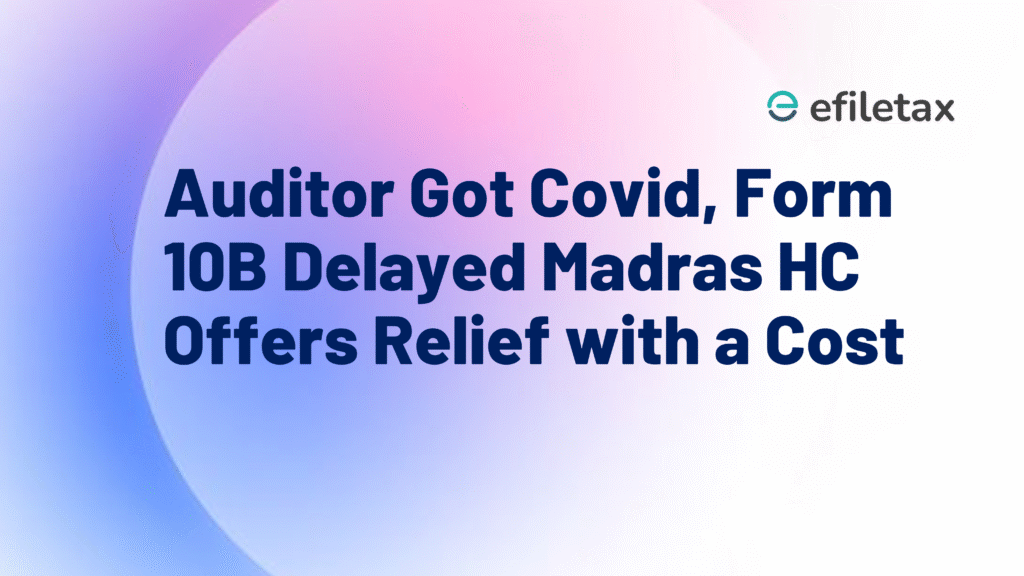
Auditor’s Covid Delay in Form 10B Filing Madras HC Grants Relief
Form 10B delay condoned — The Madras High Court has offered major relief to a taxpayer whose auditor was affected by Covid-19, leading to a 44-day delay in filing Form 10B. The Court accepted the justification and condoned the delay, subject to a ₹5,000 cost. This ruling brings clarity on reasonable cause under Section 273B of the Income-tax Act, 1961.
Let’s decode what this means for taxpayers and charitable institutions.
What is Form 10B and Why It Matters
Form 10B is the audit report filed by trusts and NGOs registered under Section 12AB (earlier 12A/12AA) of the Income-tax Act. Filing it on time is crucial to claim exemption under Section 11 and 12.
Key Facts:
- Mandatory if total income (before exemptions) exceeds ₹5 crore
- Due date: 30th September (or as notified under Section 139)
- Filed electronically with DSC of the auditor
Delay in Form 10B filing can lead to exemption denial — unless reasonable cause is proved.
Case Summary: Madras High Court Order (2024)
Case Title: Tmt. Shanta Kalyani Educational Trust vs. PCIT
Date: November 2024
Delay: 44 days
Reason: Auditor contracted Covid-19 and was advised bed rest
Court Held:
“The explanation offered is acceptable… The delay is only 44 days. There is no wilful negligence.”
– Hon’ble Justice Krishnan Ramasamy, Madras High Court
✅ Relief Granted: Delay condoned
💰 Condition: Petitioner must pay ₹5,000 to the PM CARES Fund
Legal Basis:
- Section 273B: No penalty if reasonable cause is established
- CBDT Circular No. 2/2020: Encourages leniency where Covid-19 impacted compliance
Legal Angle: Can You Claim Similar Relief?
You may seek condonation of delay under Section 119(2)(b) read with Section 273B if:
- Delay is not intentional
- There’s medical or technical cause (e.g. Covid, system downtime)
- Representations are made promptly to the Assessing Officer or CIT
Pro Tip from Experts:
“Always document medical emergencies or system issues. Attach hospital records or CA’s medical certificate in your condonation request.”
– Tax Consultant, Efiletax.in
How to File Condonation Request for Form 10B
Step-by-Step:
- Write to the Jurisdictional CIT (Exemptions) under Section 119(2)(b)
- Mention the PAN, Form 10B filing details, delay duration
- Attach supporting evidence:
- Auditor’s Covid certificate or discharge summary
- Audit report copy
- Proof of eventual filing
- Request personal hearing, if required
- Await written order condoning the delay
Compliance Tips for Trusts and NGOs
- Pre-schedule audits to avoid year-end delays
- Use Form 10BB if audit is under other provisions
- Keep backups of auditor reports and DSC tokens
- File early to avoid dependency on final week server loads
- In case of delay, act fast to file condonation
FAQ: Form 10B Delay Relief
Q1. Can Covid illness of an accountant be accepted as a valid cause?
Yes, if the illness is documented and directly impacted audit/report preparation.
Q2. Can I file Form 10B after the due date?
Yes, but exemption under Sections 11/12 may be denied unless delay is condoned.
Q3. Who grants condonation?
Jurisdictional Principal Commissioner or Commissioner of Income Tax (Exemptions).
Final Thoughts
This Madras High Court ruling offers a welcome precedent — illness during Covid-19 is a valid reasonable cause for delayed audit submissions. But relief isn’t automatic. You must act quickly, document everything, and follow due procedure.
👉 Need help filing condonation requests or Form 10B? Talk to Efiletax Experts Now
Summary
Form 10B delayed due to auditor’s Covid was condoned by Madras HC with a ₹5,000 cost. The Court accepted it as a valid cause under Section 273B. Taxpayers can seek relief with proper evidence and timely application under Section 119(2)(b). Learn compliance tips and legal process.